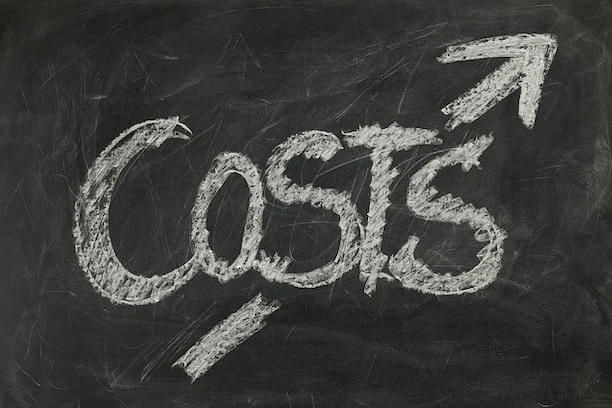Buying a home in California is a massive investment. Even some of the cheapest move-in ready homes cost $100,000 or more, and if you can find a lower cost, there is probably some work to do before it is ready for a family. Perhaps you have saved up enough to cover a 20% down payment, and your income can cover the mortgage payment as well.
When you prepare to buy a home, or any real estate property for that matter, you must also consider closing costs. Otherwise, these additional expenses could catch you by surprise and mess up the budget you had planned.
What Are Closing Costs?
Closing costs are upfront costs that must be paid to complete the transaction and transfer ownership of the property from one party to the other. These closing costs are usually paid when you finish signing the contract for the transaction. Many of these fees pay for either a service to be performed or for a service that has already been performed to facilitate the sale.
A buyer and seller will face individual closing costs that they alone are responsible for paying. Some of these expenses might be covered by both parties.
How Much Are Closing Costs in California?
Closing costs vary across the state and even from house to house. The exact number you will pay depends on a combination of factors, such as the home’s purchase price, the person facilitating the real estate transaction, state laws, the loan amount, and the type and mortgage rate you have. Let’s discuss the typical closing costs California home buyers and sellers may face.
Average Closing Costs in California
On average, buyers pay about 2–5% of the home sale price on additional closing costs. This number will vary widely depending on the circumstances of your purchase, such as where the property is located and how you are paying for it.
The seller pays more for closing costs in California, sometimes as high as 8–10% of the home’s purchase price. Again, this is dependent on numerous factors, so your closing costs could be higher or lower when you sell your house.
How to Calculate Closing Costs
Figuring out your closing costs is rather simple. All you need to do is multiply the home’s price by the percentages listed above to calculate the likely range of your closing costs. For example, let’s say you are looking for a $400,000 home. Multiply $400,000 by .02 and .05 to get $8,000 and $20,000.
This means as the buyer, you may spend between $8,000 and $20,000 on closing costs when you close on that $400,000 home. If you were selling a home for this purchase price, your closing costs could be between $32,000 and $40,000.
When Will You Find Out How Much You Owe in Closing Costs?
Unfortunately, it is difficult to plan for closing costs because they are usually calculated at the time of closing. A few fees might be paid before the transaction is completed, but most are due at signing. This is why it is important to budget for the higher end of the average closing costs so you are not taken by surprise right as you sign for your new home.
Who Pays Closing Costs in California?
In every real estate deal, there is a buyer and a seller. Closing costs are split between these two parties, which is why there is a difference between how much a seller will pay and how much a buyer will pay during real estate transactions. Let’s take a look at who is responsible for which fees in the state of California.
-
Seller Closing Costs
Sellers tend to spend a little more money than buyers on closing costs. Though there are fewer closing fees, they are much larger than most of the buyer’s expenses. Here are a few examples of seller closing costs.
-
Real Estate Agent Commission and Attorney Fee
The biggest chunk of the seller’s closing cost calculation is the fees for real estate agents and real estate attorneys. Realtors usually receive a percentage of the home value as their commission fee, and the seller usually pays for both agents.
Additionally, a real estate attorney oversees the signing of legal documents required to complete the transaction, so the seller will pay attorney fees for their services. A commission fee could be 5-6%, while an attorney fee will fall between $150 and $500 per hour.
-
HOA Documents
If the property falls under the jurisdiction of a Homeowners Association, then the sale must be registered with that association. For this, the seller will need to pay for the HOA documents that are required to register this ownership transfer with the association. This also provides critical information to the buyer who is joining that HOA as a new member.
-
Seller Concessions
Seller concessions are a negotiation tactic to make homes more affordable for buyers. In many transactions, buyers and sellers will negotiate back and forth to come to an agreed-upon price for the sale.
Part of this process is facilitated by the realtors, and seller concessions occur when the seller agrees to offset, waive, or pay for some of the costs that would normally go to the buyer. This can further incentivize a buyer who is interested in the home.
-
Title Insurance and Examination Fee
A title states who the owner of a property is and if there are any lienholders. Title insurance protects the buyer and their lender in case a dispute of ownership arises in the future. Usually, buyers cover this expense, but it could be a seller’s concession to incentivize the purchase of the property. This title insurance fee may cost $.55 to $.75 per thousand dollars.
-
Transfer Tax
California closing costs also include the transfer taxes. Sellers typically pay the real estate transfer tax during closing, but this tax is open to negotiation. Sometimes the buyer will agree to pay to obtain concessions from the seller and reduce the purchase price. All California counties have the same rate of $1.10 per $1,000 or 0.11% of the selling price.
-
Buyer Closing Costs
The buyer will face a larger quantity of closing costs in California, but the total amount is usually lower than what the seller pays. Here are the most common closing costs that you might encounter when buying a home.
-
Loan Origination Fees
The loan origination fee is required to create a mortgage for the buyer. This fee could cost between .5% and 1.5% of the mortgage value depending on the lender and the amount of money involved in the loan, as well as the loan application fee.
-
Appraisal Fee
Before a property is sold, an official appraisal is required to ensure it is worth what it is being sold for. The buyer must the appraisal fee to have this process completed by the local municipality. It could cost between $300 and $500.
-
Home Inspection
A home inspection is a critical step in the process for buyers. A professional home inspection will reveal any potential issues with the property that could cost the buyer more money to address once they move in.
Often, the results of the home inspection can help the buyer during negotiation of the home’s purchase price. The buyer must pay the home inspection fee to make this happen, which is also between $300 and $500.
-
Discount Points
Discount points can be purchased from your lender to lower the total cost of the mortgage, saving you money on interest. Often, these discount points cost 1% of the mortgage value, so purchasing one for a $100,000 mortgage would cost $1,000.
-
Private Mortgage Insurance
Sometimes, lenders require the buyer to pay their first month’s PMI premium upon closing. The amount will depend on the buyer’s credit score, down payment size, and loan amount, but the average is between $30 and $70 monthly per $100,000 borrowed.
-
Shared Closing Costs
Many of the closing costs will be split between the buyer and the seller. How much each party pays can come down to the negotiation stage. Here are some examples of average closing costs that are shared between both parties.
-
Escrow Fees
Many counties in California split the Escrow fees required to create an Escrow account for the buyer. The cost of Escrow fees is usually .2% of the mortgage value plus $250, so a $500,000 home might cost $1,250, which may be split down the middle between both parties.
-
Municipal Lien Search
A lien is a partial claim to ownership of a property. To ensure a clean transaction, a lien search is important to make sure no other parties can claim ownership of the home. This process is also known as a title search. The title search fee is between $80 and $200.
-
Prorated Property Taxes
Property taxes are often paid upfront during a real estate sale. How much this will cost depends on when the sale takes place and when the property tax bill is due each year. In many cases, the buyer and seller will split the cost of the property taxes based on how long each party owns the home for the current rate. Your property tax rate will be about 1.25% of the home value.
-
Recording Fees
A recording fee is an administrative cost paid to the local municipality to update the ownership records of the property. Recording fees vary from county to county, but you can expect to pay $120 to $150 for a recording fee, which could be split with the seller.
-
Notary Fees
A notary fee is one of the processing fees needed for the paperwork. It will only cost $15 plus potential travel expenses, so it is a very small aspect of closing costs in California.
How to Save On Closing Costs in California
Thinking about all the extra fees associated with buying a home could make your head spin. Fortunately, there are strategies to reduce the amount of money you will need to cover these closing costs when you buy a home.
-
California First-Time Homebuyer Programs
The California Housing Finance Agency offers numerous first mortgage programs with better terms and rates for first-time homebuyers.
The California Dream for All Program can provide up to 20% or $150,000 to help first-time homebuyers afford their properties, only having to pay back that money when they sell the home. CalHFA and CalPLUS programs are also available for conventional and FHA loans to reduce closing costs and down payments.
-
California Down Payment Assistance Programs
Down payment assistance is a popular method for helping buyers afford the homes they want. They often benefit buyers who do not have a lot of money saved but have a strong credit history. You can qualify for the down payment assistance program through F5 Mortgage if you have a credit score of 640 and a DTI no higher than 50%.
The Golden State Finance Authority also offers multiple programs to help with down payments and closing costs. Throughout the state, the MyHome Assistance Program also reduces down payment and closing cost burdens through a deferred payment junior loan.
-
Negotiate With the Seller
The most effective way to lower your closing costs in California is to negotiate with the seller. If they are motivated to sell, they might be willing to pay more of the property taxes or the loan origination fees. If errors are found during the inspection, you can leverage them to get a lower purchase price for the home, which will also reduce many of the California closing costs.
You should also know that cash buyers pay fewer closing costs than those with loans, and many sellers enjoy this option as well.
-
Close the Deal Towards the End of the Month
On average, homebuyers in California can save between $500 and $2,000 by pushing their closing date to the end of the month. There are several reasons for this.
First, your initial mortgage payment will include less accrued interest because you only owned the home for a few days in the preceding month.
Second, many sellers want to start the new month with a clean slate, so they can make some concessions to get the deal done by the end of the month. They may even slightly lower the price of the home, which will affect the total closing costs paid by the buyer.
-
Select the Best Loan Option
Mortgage-related closing costs can also be reduced with the right loan program from a specific lender. For example, you could choose a custom loan option from F5 Mortgage that will lower your estimated closing costs. Some loans have more favorable terms than others, so you can access lower closing costs with the help of our loan officer.
Summary
The average closing cost of a home in California is hard to calculate due to the numerous factors that impact that final number. The estimate will change based on the property’s location, whether the home is in Southern California or Northern California.
The seller’s motivation will also play a role in what fees they might agree to cover such as property taxes, title insurance, or mortgage origination fees.
The right lender can prepare you for a more affordable closing cost estimation. Get in touch with F5 Mortgage to discuss your options by calling 888-459-0483 or filling out the online quote request. Our team will get back to you to figure out what your financing needs are for a home in California.
FAQs
Why are California closing costs so high?
At one point, California had the fourth-highest closing costs in the nation. As of 2021, when the District of Columbia was included [1], the state has been the 11th in the country. The reason California has been so high on this list is the value of the average property in the state, which is roughly $737,677.
How long does a closing take in California?
In California, the typical timeline for closing on a home is between 30 and 45 days. There are plenty of factors that will affect this range, such as the seller’s willingness to negotiate, the time of year, the loan approval process, and if any disputes occur on the title. The seller’s search for their next home could also impact when the closing date is scheduled.
How much are closing costs on a $300,000 house in California?
Since the buyer can expect to pay 2–5% on closing costs for a $300,000 home, the estimate is between $6,000 and $15,000, depending on the property’s location. If you can get some seller concessions or you are prepared to pay cash for the house, you will likely pay the lower end of that range or even less.
How do I calculate my closing costs as a seller in California?
Sellers usually pay more on closing costs than buyers, typically between 8–10% of the home’s purchase price. This is so much higher for sellers because of the real estate agent commission, which could be as high as 6% of the cost of the home. If you’re selling a $300,000 home, you might pay $24,000 to $30,000 in various closing costs like property tax and title insurance fees.
What are normal closing costs in California?
In 2021, the average total closing costs, including all taxes, were almost $8,000. This average is in line with the average cost of a home around that time, which was just under $800,000. Again, you can expect to pay 2–5% of the home value in closing costs when you sign the contract.
Resources: [1] NAR – Average Closing Costs









Thank you for your sharing. I am worried that I lack creative ideas. It is your article that makes me full of hope. Thank you. But, I have a question, can you help me?
I don’t think the title of your article matches the content lol. Just kidding, mainly because I had some doubts after reading the article.
Your point of view caught my eye and was very interesting. Thanks. I have a question for you.